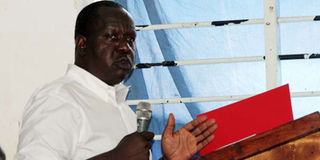‘Matiang’i rules’ pay off as KCSE results are announced

Education Cabinet Secretary Fred Matiang'i on December 29, 2016, when he announced this year's KCSE results at Shimo la Tewa High School in Mombasa. PHOTO | LABAN WALLOGA | NATION MEDIA GROUP
What you need to know:
- Education Cabinet Secretary Fred Matiang’i said there were no cases of irregularity this time round.
- The marking of the exam was done between December 2 and 24 by 16,637 examiners, who were accommodated in 25 marking centres.
- Previously, exam centres were distributed across the country, roughly mirroring former provincial divisions.
Technology, strict supervision and centralised marking are some of the measures deployed by the government to beat the runaway cases of cheating that had engulfed the education sector for years.
Announcing the 2016 Kenya Certificate of Secondary Education (KCSE) examination results on Thursday, Education Cabinet Secretary Fred Matiang’i said there were no cases of irregularity this time round. He added that all the candidates will get their results because of the measures employed to restore integrity in the sector.
The marking of the exam was done between December 2 and 24 by 16,637 examiners, who were accommodated at 25 marking centres.
“For the first time, these centres were all located in Nairobi and its surroundings in a move that greatly increased efficiency and effectiveness of the marking process,” said Dr Matiang’i.
Previously, exam centres were distributed across the country, roughly mirroring former provincial divisions.
And, interestingly, even though marking was completed before Christmas, results would not be released until up to late February, and sometimes March. Dr Matiang’i said cartels used this period to haggle with corrupt schools.
He said KNEC installed ICT equipment in all the centres and results were streamed live to the KNEC Command and Control Centre.
“To be sure, we observed misbehaviour in three or four teachers and we removed them immediately and handed them over to the TSC for disciplinary action,” said Dr Matiang’i. “TSC will proceed with disciplinary action.”
INTRODUCED TOUGH RULES
The measures were a continuation of the tough rules introduced earlier in the year in the administration of exams and their marking.
In May, Dr Matiang’i reorganised the school calendar and introduced far-reaching changes in the administration of national exams to curb cheating.
He banned all social activities in the third term — including prayer days, visiting, half-term breaks, sports, prize-giving ceremonies and annual general meetings — to cut contact between candidates and outsiders.
He also shortened the period for the KCSE exam from six weeks to four and put headteachers directly in charge of the tests in their respective schools.
The CS said it took the coordinated effort of the Ministries of Education, Interior and ICT to pull it off.
“The most fundamental objective of these measures was to restore the credibility of the academic certificates of our learners at all levels of our education system,” Dr Matiangi said at Shimo la Tewa Secondary School in Mombasa.
Thursday was the first time in 27 years that results of the national secondary school examination were released in the year it was sat.
The government has been under pressure to reform the exams council following massive irregularities that saw the results of about 2,709 primary and 5,100 secondary school candidates cancelled last year.
In 2014, some 3,353 cases of exam cheating were recorded in 41 counties, a marked increase from previous years.





